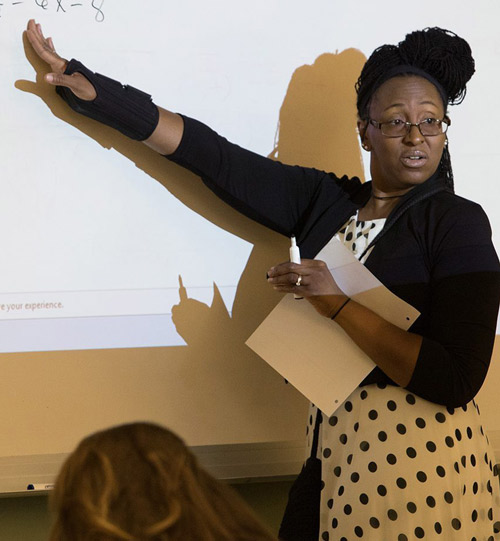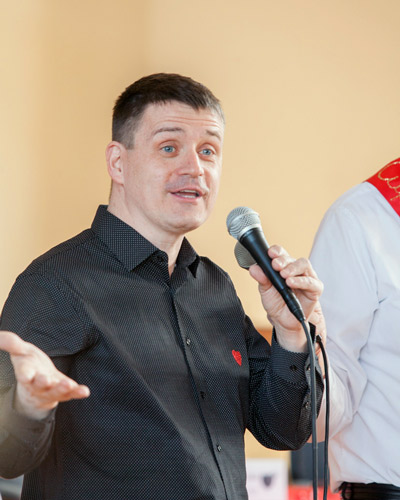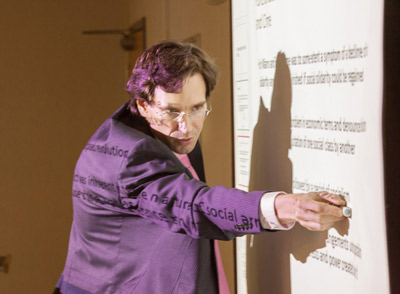- Apply
- Visit
- Request Info
- Give
Faculty Cut Textbook Expenses with ‘Open Education Resources’
Written by Dwight Bachman
Published on August 01, 2019

Three Eastern Connecticut State University professors will help their students save a significant amount of money on textbooks this fall due to CSCU-funded grant project. Nicolas Simon, assistant professor of sociology, Associate Professor of English Daniel Donaghy and Associate Professor of Mathematics Kim Ward will receive CSCU grants to develop and support Open Education Resources (OER) strategies in their classrooms that will reduce the overall cost of textbooks.
OER makes learning a collaborative effort by tailoring existing resources to the specific content of a professor’s course. OER materials include digital learning materials, modules, lectures, games, simulations, course syllabi, homework assignments and quizzes. Studies show that professors use these open resources in a similar manner to traditional textbooks.
According to the U.S. Public Interest Research Group (PIRG), the price of college textbooks has soared, increasing by 73 percent—four times the rate of inflation— over the past decade. Many textbooks cost more than $200, some as high as $400. The PIRG says nearly 5.2 million undergraduate students spend $3 billion of financial aid on textbooks each year. One in three students used more than $300 a semester in financial aid to pay for their textbooks. At $12/hour, a student would have to work 20 hours on campus to cover the cost of a single $250 textbook.
When Reference and Instruction Librarian Angela Walker and her colleagues hosted an outreach event to promote the use of OER on campus, student Ailyn Dilone from Eastern’s Student Government Association (SGA) revealed the results of research she had conducted. It showed that “students either do no purchase the textbook at all, which negatively affects their learning, or drop classes altogether because they cannot afford the required materials. Free or affordable textbooks would allow students to do their reading, come prepared to class and do their homework. If students spend less hours working to pay for textbooks, they have more time to study. The use of OER supports student retention and shows that we care.”

“In the spirit of knowledge sharing, the quantity of valuable resources is steadily growing,” said Walker, who works with grantees. “OER are learning resources in the public domain and can, with permission, be used freely by any teacher.”
Math Professor Ward began exploring OER in 2008 as the coordinator of Eastern’s Math Foundations Program, employing OER materials in her Algebra and Precalculus Mathematics and Calculus Technology classes to provide students with significant cost reductions on textbooks. This fall, she will adopt her class “Differential Equations” to an OER strategy. She notes that the sequential nature of math, coupled with its own vocabulary, need for persistent studying and the speed at which math is taught creates major problems for students. She says the addition of expensive math textbooks is a “recipe for failure.”
Today, thanks to Ward’s use of a free textbook and supplemental practice materials for her course in Blackboard, students have unlimited attempts to completing problems; access to online textbooks, videos and worksheets; flexibility of deadline dates; and easy submission of assignments. During the 2018-19 academic year, 705 students of Ward’s students had no textbook or software expenses, up from 126 during the 2014-15 academic year. “This is important to me. I may not be able to reduce tuition, but using and promoting the use of EOR is a viable way to help as a faculty member, as it has provided students with much needed financial relief.”
English Professor Donaghy will be breaking new ground in his English 233 course this fall, as there are currently no OER materials available for a literature course in contemporary poetry. He said he will begin by reviewing available resources and then research other online resources for materials. He wants to make sure his course is “culturally relevant, with a reading list that includes the widest range of voices that I can find.”

Donaghy says, “I will use the open textbook ‘Naming the Unnamable: An Approach to Poetry for New Generations’ by Michelle Bonczek as a starting point for my OER project.” Donaghy expects to save money on textbooks for 25 students. “I hope to keep the total cost of textbooks below $40.”
Simon surveyed students before submitting his application. He will use OER in two sections of his Introduction to Sociology courses this fall. He also created supplemental materials with his application—Powerpoints, discussion topics on current events and happenings in the community, learning exercises, and course and student outlines—which he hopes his colleagues in the 17 CSCU institution will use to relieve their students from financial constraints as well.
Simon previously used “Society: The Basics” by Macionis which cost about $100. Using OER, his students can download his adopted textbook—“Introduction to Sociology, Second Edition”— for free. Students who prefer a paper version can rent it for about $15 or buy their own copy for $20-$30. Based on Simon’s research, “If students buy or rent my OER materials, I anticipate a savings of $5,190 for my 40 students this fall. If only 10 more instructors select this textbook in the CSCU system, the savings for students can be more than $50,000.”
Walker said the attempt to make education affordable to all is a growing movement worldwide. She said she and her colleagues, along with the staff from the Center for Instructional Technology, are available to help professors with technical help in integrating OER into Blackboard in their classrooms.


